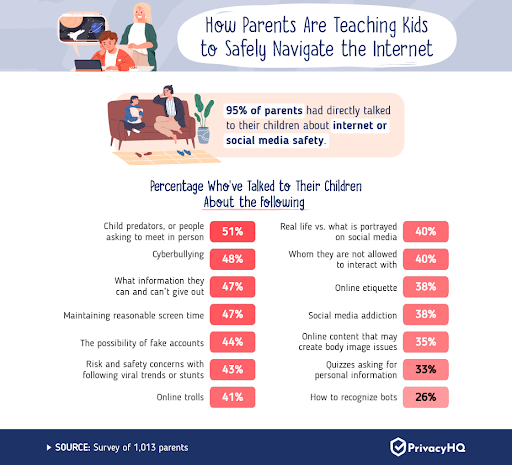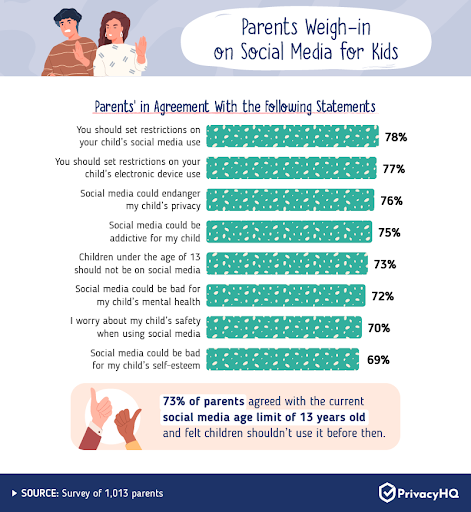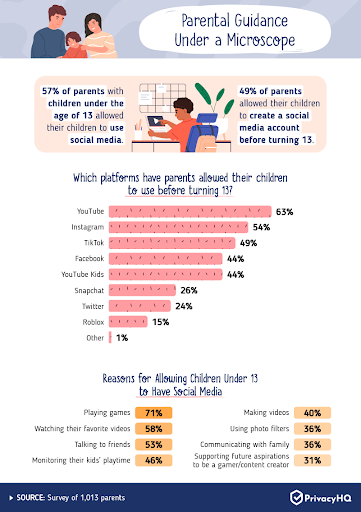How do you know, when is it OK to allow your children to use social media and internet? This is a highly contentious subject with a wide range of possible responses. Many believe that children under the age of eight should be able to use social media, while others believe that they should not be permitted to register an account until the age of 15. As a parent, judging how much time your kid spends on social media may be difficult. When it comes to getting their parents to allow them to set up an account on social media sites like Facebook or Instagram, many young children have fits or do their best to persuade them. As a way to put an end to the tension, parents frequently agree to such demands. Young children's safety and social media users are often on the minds of parents, especially in the first few years of their lives.
There is a growing issue of underage mobile phone use, with many children receiving their first phones at a young age. When it comes to persuading their parents that they need an internet connection or a new technology, youngsters have grown more persuasive than ever before. Having a personal mobile phone means that a youngster may quickly establish a profile on social media. It's not uncommon for children to set up social media profiles without their parents' knowledge. Technology has given rise to many applications and tactics that serve to hide the presence of a certain app. Using this method, children can trick their parents relatively easily. As a parent, it is crucial to determine the appropriate age at which your kid may be granted access to a smartphone and social networking sites.
There are a variety of individuals on social media and a wide range of information, and the appropriate age for use is based on this knowledge. It's best to wait till your child is a little older before letting him or her use it. As a general rule, 13 is a good age for introducing your kid to social media, but only if they are supervised. The majority of children at this age begin requesting a cell phone from their parents. Even if you don't allow your teenager to establish social media accounts, they will find a way around your restrictions once they reach the age of majority. To prevent a scenario like this, it's best to avoid it at all costs. Acquire and maintain your child's confidence, and make certain terms and conditions very apparent. Maintain openness while ensuring that he receives the privacy he needs. As a parent, you and your kid will both benefit from a healthy dose of self-awareness. Take a look at below infographics and charts from PrivacyHQ for more insights on parenting trends when it comes to letting kids use the social media.
Read next: Unemployment is a global issue, but the rising percentage of young people who are unemployed is of particular concern
There is a growing issue of underage mobile phone use, with many children receiving their first phones at a young age. When it comes to persuading their parents that they need an internet connection or a new technology, youngsters have grown more persuasive than ever before. Having a personal mobile phone means that a youngster may quickly establish a profile on social media. It's not uncommon for children to set up social media profiles without their parents' knowledge. Technology has given rise to many applications and tactics that serve to hide the presence of a certain app. Using this method, children can trick their parents relatively easily. As a parent, it is crucial to determine the appropriate age at which your kid may be granted access to a smartphone and social networking sites.
There are a variety of individuals on social media and a wide range of information, and the appropriate age for use is based on this knowledge. It's best to wait till your child is a little older before letting him or her use it. As a general rule, 13 is a good age for introducing your kid to social media, but only if they are supervised. The majority of children at this age begin requesting a cell phone from their parents. Even if you don't allow your teenager to establish social media accounts, they will find a way around your restrictions once they reach the age of majority. To prevent a scenario like this, it's best to avoid it at all costs. Acquire and maintain your child's confidence, and make certain terms and conditions very apparent. Maintain openness while ensuring that he receives the privacy he needs. As a parent, you and your kid will both benefit from a healthy dose of self-awareness. Take a look at below infographics and charts from PrivacyHQ for more insights on parenting trends when it comes to letting kids use the social media.
Read next: Unemployment is a global issue, but the rising percentage of young people who are unemployed is of particular concern






